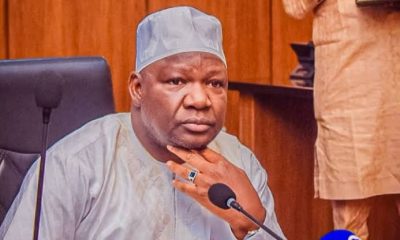Economy
Hurricane at CBN; 1,000 workers set to go into unemployment market

Barring any last-minute changes, the Central Bank of Nigeria (CBN) will soon retire about 1,000 of its employees before the end of the year, investigations have shown.
Reliable sources at the apex bank’s headquarters revealed that the retirement would gulp over N50 billion in payoff to the affected workers.
In what it described as a strategic realignment of its workforce, the CBN’s Board of Governors, led by Olayemi Cardoso, had expressed commitment to reducing the workforce.
In the last 10 months,t the CBN had disengaged many of its staffers, including 17 directors, who served under the immediate past governor, Godwin Emefiele.
Minimum wage: States race to beat NLC deadline
FG begins malaria vaccination for children today
Those 17 directors are yet to be replaced.
A circular released three weeks ago by the CBN, sighted yesterday by our reporter, said the application for Early Exit Package (EPP) was open to all cadres of staff and will close by Saturday, December 7.
Exempted are those yet to be confirmed or who have served less than one year “as of the date of publication with the effective date of exit set at 31 December, 20, 2024.
Officials told Daily Trust that the apex bank was targeting retirement of over 1,000 staff members.
The officials, who pleaded anonymity, told our correspondent that at least 860 staff from the various departments have already applied for the EPP.
The management described the EEP as a voluntary programme offering eligible employees an incentive to exit the CBN early, “while providing employees seeking other career options a great opportunity for early exit.”
It cautioned that the staffers could not change their minds after applying, saying that all completed and submitted applications are final.
The EEP stated that financial incentives for senior supervisors to deputy managers shall be for the remaining period in service, up to a maximum of 60 months of current grade’s gross annual emoluments.
It also noted that financial incentives for managers shall be for the remaining period in service, up to a maximum of 36 months of current grade’s gross annual emoluments.
“Financial incentives for all other cadres of staff shall be for the remaining period in service, up to a maximum of 18 months of current grade gross annual emoluments,” it added.
The EEP also provides for non-financial incentives, including “financial planning and entrepreneurial capacity building programme, purchase of laptops in line with the Bank’s current policy and extended medical care for an additional three months for self and dependents after the expiration of the three-month current provision of access to medical windows care by exited employees.”
‘They’re offering me N97m for 4-yr service’
A staff member, who spoke to our reporter, said: “The way they dated the offer, you’ll know that the target is actually from senior supervisors to deputy managers. If you look at it, they’re mostly those that came in within the 9 years of Governor Emefiele.
“For instance, I’ve worked for 4 years in the bank; the package they’re giving me is between N92 million to N97 million.
“Some others have worked up to a manager level and are only entitled to N64.5 million. So, the more time you have to go, the more money they pay you because you know, for them, you don’t have gratuity”, the staff said.
Another staff told Daily Trust yesterday that during a webinar held on Friday, the Human Resource Department of the bank expressed the apex bank’s decision to get the number it was targeting for the EEP.
“There is serious tension, serious apprehension. You can imagine the atmosphere. It is terrible.
“As of Friday, there were 860 people so far that have indicated interest in the EEP,” the staff said. (Text, excluding headline: Daily Trust)
Economy
OPay Scam Alerts advises Nigerians to remain vigilant against dubious activities

You are just seconds away from sending money – the offer sounds perfect, the seller seems trustworthy and the clock is ticking.
But just before you hit send, one of Nigeria’s leading financial institutions, OPay flashes a critical warning: “Caution – this account has been linked to suspicious activity.”
In that moment, the rush fades, your instincts kick in, and you realise you were on the brink of falling for a scam. One smart alert, one timely pause — and your hard-earned money stays exactly where it should: safe.
This is the power behind OPay’s multi-layered scam alert system — an Artificial Intelligence (AI)-driven, real-time defense network designed to detect and stop fraudulent transactions before they happen.
At the heart of it is a machine learning engine trained on thousands of scam patterns, user reports, flagged accounts, and unusual transaction behaviors. But OPay’s approach goes far beyond a single alert.
How OPay’s scam alert ecosystem works
Abnormal Transaction Pop-Up Reminders
When suspicious behavior is detected, OPay immediately interrupts the flow with a clear, targeted pop-up message. Every day, over 60,000 users receive these urgent fraud warnings — and thanks to that, 30,000 risky transactions are stopped in their tracks.
Intelligent Outbound Call Reminders
For higher-risk transactions, OPay activates a multi-channel response, sending warnings via SMS, email, app notifications, and even escalating to customer service calls. This proactive layer reaches more than 10,000 users daily, discouraging over 8,000 fraudulent transactions.
Interactive Q&A Verification
In cases where more context is needed, users are engaged with real-time Question & Answer (Q&A) prompts to understand the purpose of their transaction. If red flags are confirmed, the system presents a tailored warning or ends the transaction flow altogether. This feature alone helps deter over 46,000 scam attempts daily from the 50,000+ users who interact with it.
Together, these layers form a real-time scam detection and prevention engine that evolves with every user interaction. OPay’s system doesn’t just warn — it learns and adapts, constantly improving its accuracy and response time.
Many users don’t even know they’re in danger until OPay steps in. As one X user, @JAHS, shared: “OPay alerted me that I might be sending money to a scammer when I wanted to patronize an IG vendor. Stopped the transaction ASAP.”
These interventions are happening silently, daily – often before the user even suspects something is wrong.
OPay’s scam alert system is part of a broader philosophy: security is not just about technology – it’s about trust. From scam alerts to Face ID transaction verification, USSD instant account locking, the Large Transaction Shield, and automated callback alerts, every tool is designed to protect users in the moments they can’t predict.
As scams get more sophisticated, the future of financial safety depends on real-time prevention. And OPay isn’t waiting for fraud to happen — it’s stopping it in its tracks. Sometimes, the smartest financial decision you make… is the one OPay helped you avoid.
Economy
States face allocation cuts as agency demands N100bn monthly

The monthly statutory allocations to state governments from the federation account may decline in the coming months following an official request by the Nigeria Sovereign Investment Authority to boost the nation’s residual funds with the support of N100bn monthly.
The request, which was presented by the Managing Director and Chief Executive Officer of NSIA, Aminu Umar-Sadiq, is aimed at unlocking large-scale investments to drive Nigeria’s economic growth.
He made the request at the March revenue-sharing meeting of the Federation Account Allocation Committee held between April 14 and 15, 2025. Our correspondent obtained a copy of his presentation during the meeting on Friday.
Umar-Sadiq appealed to the committee, which includes state commissioners of finance, to consider and approve the request, with funding proposed to commence from the March FAAC allocation.
The presentation was titled, “Activating Residual Funding for the Nigeria Sovereign Investment Authority – Unlocking Opportunities for Large-Scale Investments to Drive Nigeria’s Economic Growth.”
According to the document, the NSIA is requesting a structured monthly disbursement of N100bn from Residual Funds—revenues in the Federation Account beyond projected hydrocarbon income—to establish a Naira-based investible capital pool.
The move, the authority says, will enhance its capacity to finance critical domestic infrastructure projects.
The MD said, “The funding would position the authority as a leading sovereign wealth fund globally, promoting responsible and strategic investments for Nigeria’s economic development and enhancing its threefold mandate to build a savings base for the country, enhance the development of infrastructure, and provide stabilisation support.”
He explained that residual funds are a legitimate source of funds transferred to the authority, provided that the derivation portion of the revenue allocation formula shall not be included as part of this funding.
Economy
More Nigerians to experience poverty by 2027 – World Bank

The World Bank’s latest Africa’s Pulse report has projects a grim future for Nigeria, with poverty expected to rise by 3.6 percentage points by 2027.
Released during the IMF and World Bank Spring Meetings in Washington, DC, the report cites Nigeria’s reliance on oil, economic fragility, and governance challenges as key drivers.
It highlights the country’s structural economic weaknesses, dependence on oil revenues, and national fragility as key barriers to meaningful poverty reduction.
“Poverty in resource-rich, fragile countries, including large economies like Nigeria and the Democratic Republic of Congo, is projected to increase by 3.6 percentage points between 2022 and 2027,” the report stated.
Despite recent growth in Nigeria’s non-oil sector during the last quarter of 2024, the World Bank warns that this progress is unlikely to translate into widespread poverty alleviation due to ongoing fiscal and institutional challenges.
The report emphasizes that Sub-Saharan Africa remains the world’s poorest region, with an overwhelming 80% of the globe’s 695 million extreme poor residing there in 2024.
Within the region, half of the 560 million extremely poor people were located in just four countries, including Nigeria.
In stark contrast, South Asia accounted for 8% of the world’s extremely poor population, East Asia and the Pacific 2%, the Middle East and North Africa 5%, and Latin America and the Caribbean 3%.
The World Bank attributes the rising poverty in Nigeria and similar economies to weakening oil prices and fragile governance structures, noting: “This follows a well-established pattern whereby resource wealth combined with fragility or conflict is associated with the highest poverty rates, averaging 46% in 2024, which is 13 percentage points higher than in non-fragile, resource-rich countries.”
Meanwhile, non-resource-rich countries in Africa are experiencing stronger economic growth and faster poverty reduction, buoyed by high agricultural commodity prices and more resilient fiscal policies.
To reverse Nigeria’s downward poverty trend, the World Bank recommends reforms that prioritize inclusive economic growth and stronger public financial management.
It calls on the government to focus on “improving fiscal management and building a stronger fiscal contract with citizens to promote inclusive economic development and long-term poverty alleviation.”
-

 News12 hours ago
News12 hours agoJust in: Senator Natasha tenders satirical ‘apology’ to Akpabio
-

 News6 hours ago
News6 hours agoInsecurity: BUDA urges govt to quickly rescue Baruten from terrorists
-

 News8 hours ago
News8 hours agoUNUSUAL! Without invitation, Police declared me wanted — Daughter of ABC Transport owner
-

 News3 hours ago
News3 hours agoBreaking: Late gospel singer Osinachi’s husband sentenced to death by hanging
-

 News4 hours ago
News4 hours agoWeeks to 2nd anniversary, Niger deputy gov, plans to resign, move out personal effects
-

 News20 hours ago
News20 hours agoBenue LG chairman gives Fulanis 48hrs to leave all farmlands
-

 Metro13 hours ago
Metro13 hours ago‘My husband always makes love throughout the night until morning’ – Woman Wants Divorce
-

 News21 hours ago
News21 hours agoFive suspected kidnappers eliminated by police in Delta


















